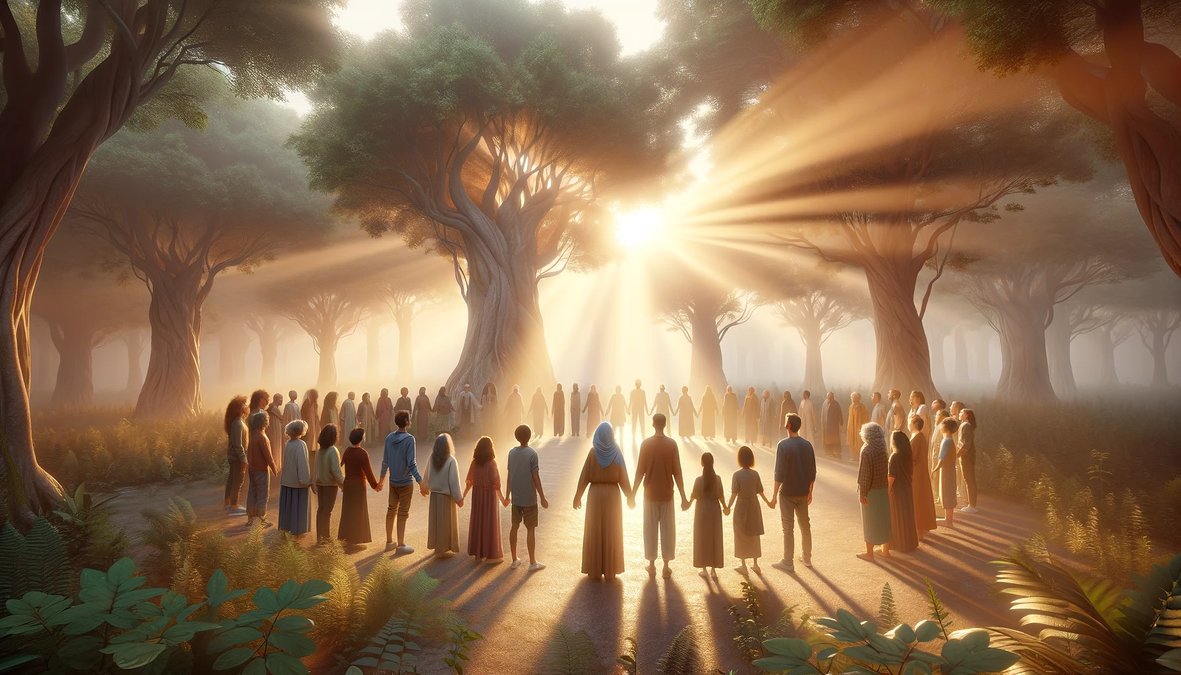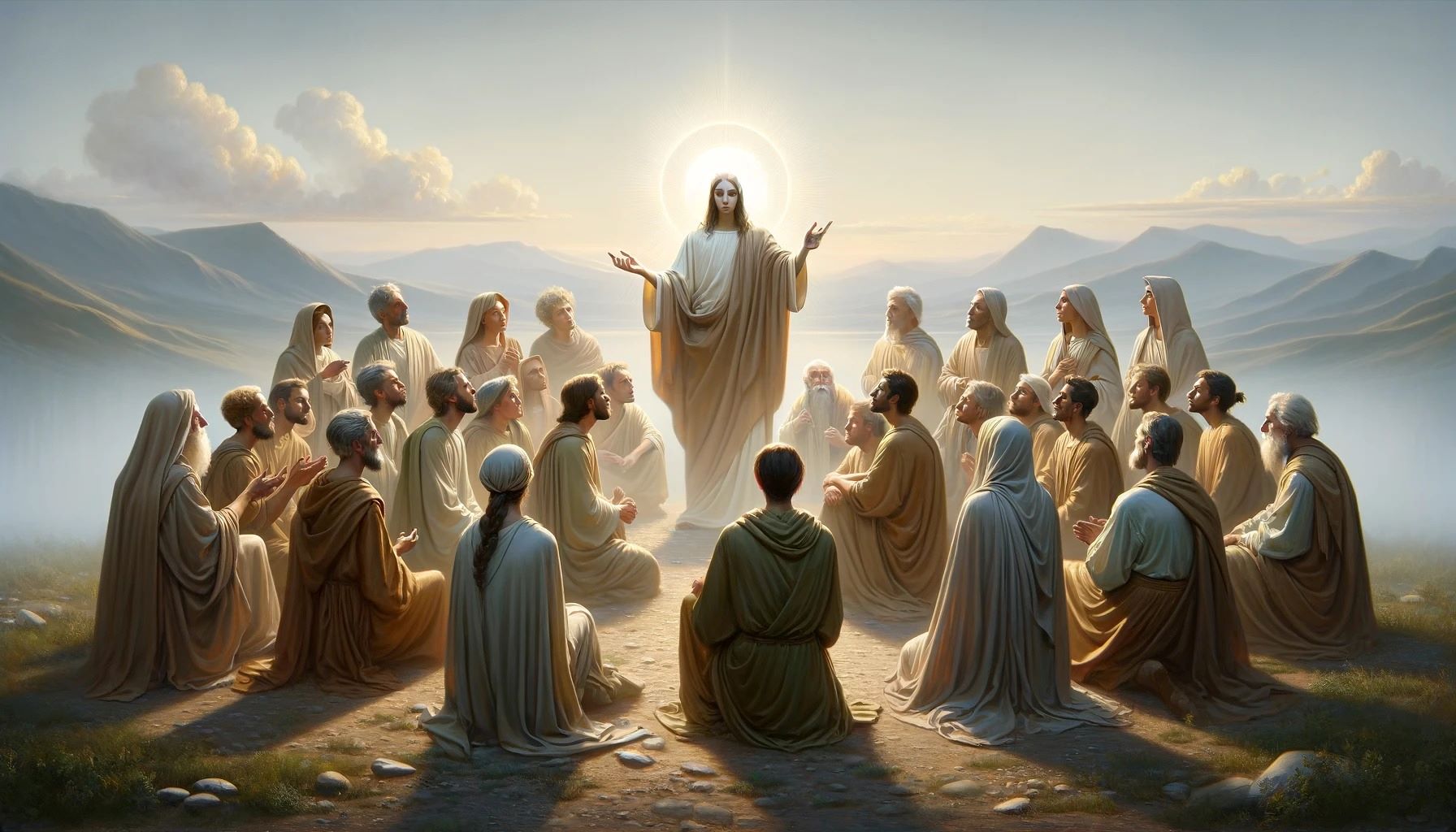Home>Christian Videos>Bible Stories>What Do Mormons Believe About Jesus Christ


Bible Stories
What Do Mormons Believe About Jesus Christ
Published: February 29, 2024
Jason DeRose, Managing Editor at Christian.net, uses his expertise in religion and journalism to deepen understanding of faith's societal impacts. His editorial leadership, coupled with a strong academic background, enriches the platform’s diverse content, earning him recognition in both journalism and religious circles.
Discover what Mormons believe about Jesus Christ and his role in the Bible stories. Learn about their unique perspectives and teachings on the Savior.
(Many of the links in this article redirect to a specific reviewed product. Your purchase of these products through affiliate links helps to generate commission for Christian.net, at no extra cost. Learn more)
Table of Contents
The Divinity of Jesus Christ
The divinity of Jesus Christ is a central belief in the Mormon faith. Mormons believe that Jesus Christ is the literal Son of God, the Savior and Redeemer of the world. They believe in the divine nature of Jesus Christ, that He is the only begotten Son of God in the flesh. This belief is rooted in the Book of Mormon, which testifies of Jesus Christ's divinity and His role as the Savior of all mankind.
-
Jesus Christ as the Son of God: Mormons believe that Jesus Christ is the literal Son of God the Father. They believe in the biblical account of the Annunciation, where the angel Gabriel announced to Mary that she would conceive and bear a son, who would be called the Son of the Highest. This belief in Jesus Christ's divine parentage is fundamental to the Mormon faith.
-
Jesus Christ as the Savior and Redeemer: Mormons believe that Jesus Christ's divine mission was to atone for the sins of the world and provide a way for all people to be saved. They believe in His role as the Redeemer, who suffered for the sins, pains, and afflictions of all mankind. This belief in Jesus Christ's redemptive power is central to Mormon theology.
-
Jesus Christ's Ministry and Miracles: Mormons believe in the divinity of Jesus Christ as evidenced by His ministry and miracles. They believe in His ability to heal the sick, raise the dead, and perform other mighty works. They see these miracles as a testament to His divine nature and mission.
-
The Testimony of Prophets: Mormons believe in the testimonies of ancient and modern prophets who have borne witness of Jesus Christ's divinity. They believe in the words of prophets like Isaiah, Jeremiah, and others who prophesied of His coming and testified of His divine nature. They also believe in the testimonies of modern-day prophets and apostles who continue to testify of Jesus Christ as the Son of God.
In summary, the divinity of Jesus Christ is a foundational belief in the Mormon faith. Mormons believe in Jesus Christ as the literal Son of God, the Savior and Redeemer of the world, and the central figure in God's plan of salvation for all mankind. This belief in Jesus Christ's divine nature shapes the way Mormons worship, live their lives, and strive to follow His teachings.
The Atonement of Jesus Christ
The atonement of Jesus Christ is a fundamental doctrine in the beliefs of the Mormon faith. Mormons believe that through His atonement, Jesus Christ suffered for the sins and pains of all mankind, providing a way for individuals to be forgiven and ultimately return to God's presence. This profound act of love and sacrifice is central to the plan of salvation as understood by Mormons. Here are some key aspects of the Mormon belief in the atonement of Jesus Christ:
-
Redemption through Sacrifice: Mormons believe that Jesus Christ's atonement was a voluntary and infinite sacrifice. They believe that He suffered for the sins, pains, and afflictions of all people, making it possible for individuals to repent and be forgiven. This atoning sacrifice is seen as the ultimate expression of God's love for His children.
-
Forgiveness and Mercy: Mormons believe that through the atonement of Jesus Christ, individuals can find forgiveness for their sins and receive mercy from God. They believe that as individuals exercise faith in Jesus Christ, repent of their sins, and strive to keep His commandments, they can access the blessings of His atonement, including the opportunity for spiritual rebirth and reconciliation with God.
-
Healing and Comfort: Mormons believe that the atonement of Jesus Christ provides healing and comfort to those who are suffering. They believe that through His atonement, individuals can find strength to overcome challenges, find peace in times of trial, and receive the assurance of God's love and care for them.
-
Eternal Perspective: Mormons believe that the atonement of Jesus Christ has eternal significance. They believe that through His atonement, individuals can have hope for the future, knowing that because of His sacrifice, they can overcome physical death and spiritual separation from God. This belief in the eternal impact of the atonement shapes the way Mormons approach life's challenges and uncertainties.
In summary, the atonement of Jesus Christ is a central and profound belief in the Mormon faith. Mormons believe in the redemptive power of Jesus Christ's atonement, the opportunity for forgiveness and healing it provides, and its eternal significance in God's plan for His children. This belief in the atonement of Jesus Christ influences the way Mormons approach repentance, forgiveness, and their relationship with God and others.
The Resurrection of Jesus Christ
The resurrection of Jesus Christ holds profound significance in the beliefs of the Mormon faith. Mormons firmly believe in the literal resurrection of Jesus Christ, viewing it as a pivotal event in the plan of salvation. Here are some key aspects of the Mormon belief in the resurrection of Jesus Christ:
-
Victory over Death: Mormons believe that Jesus Christ's resurrection signifies His victory over physical death. They view His triumph over the grave as a demonstration of His divine power and as a promise to all humanity that through Him, they too can overcome death and be resurrected.
-
Hope and Healing: Mormons see the resurrection of Jesus Christ as a source of hope and healing. They believe that through His resurrection, individuals can find comfort in times of grief and assurance that life extends beyond mortality. This belief provides solace and strength to Mormons as they face the loss of loved ones and their own mortality.
-
Eternal Life: Mormons believe that Jesus Christ's resurrection offers the promise of eternal life to all who accept Him. They see His triumph over death as the means by which individuals can be reunited with God and experience the blessings of exaltation and eternal life in His presence.
-
Witnesses and Testimonies: Mormons find validation of Jesus Christ's resurrection in the testimonies of ancient and modern prophets. They believe in the accounts of His resurrection as recorded in the Bible and the Book of Mormon, as well as the testimonies of apostles and other witnesses who have borne witness of His resurrection.
In summary, the resurrection of Jesus Christ is a foundational belief in the Mormon faith. Mormons hold firm to the reality of His resurrection, finding in it hope, healing, and the promise of eternal life. This belief shapes the way Mormons approach mortality, grief, and their understanding of the divine plan for all humanity.
The Second Coming of Jesus Christ
The Second Coming of Jesus Christ is a pivotal belief in the Mormon faith, carrying profound significance in their understanding of the future and the fulfillment of God's plan for humanity. Mormons hold firm to the conviction that Jesus Christ will return to the earth in the latter days, ushering in a new era of peace, righteousness, and divine judgment. Here are some key aspects of the Mormon belief in the Second Coming of Jesus Christ:
-
Fulfillment of Prophecy: Mormons believe that the Second Coming of Jesus Christ fulfills ancient and modern prophecies found in the Bible, the Book of Mormon, and the teachings of latter-day prophets. They see the signs of His coming as foretold by ancient prophets and as reiterated by modern-day revelation, including the restoration of the gospel, the gathering of Israel, and the spread of righteousness and wickedness in the world.
-
Restoration of All Things: Mormons believe that the Second Coming of Jesus Christ will mark the restoration of all things, including the establishment of His millennial reign, the resurrection of the just, and the final judgment. They view His return as the culmination of God's plan for His children, bringing about the fulfillment of divine promises and the resolution of all things pertaining to humanity's eternal destiny.
-
Preparation and Anticipation: Mormons are encouraged to prepare for the Second Coming of Jesus Christ by living lives of faith, repentance, and obedience to His commandments. They are taught to anticipate His return with hope and readiness, striving to be found worthy of His presence and blessings. This belief in the imminent return of Jesus Christ motivates Mormons to live with purpose and to prioritize their spiritual growth and service to others.
-
Global Impact: Mormons believe that the Second Coming of Jesus Christ will have a global impact, affecting all nations and peoples. They see His return as a time of both cleansing and redemption, where the righteous will be gathered and the wicked will be held accountable. This belief in the universal nature of His coming shapes the way Mormons view the future of the world and their role in preparing for His return.
In summary, the Second Coming of Jesus Christ is a central and profound belief in the Mormon faith. Mormons hold firm to the conviction that Jesus Christ will return to the earth, fulfilling prophecy, restoring all things, and ushering in a new era of divine governance. This belief shapes the way Mormons live their lives, anticipate the future, and strive to align themselves with God's purposes for humanity.
The Role of Jesus Christ in Salvation
The role of Jesus Christ in salvation is a central and foundational belief in the Mormon faith. Mormons believe that Jesus Christ plays a pivotal role in the salvation and exaltation of all humanity, offering the opportunity for individuals to be reconciled with God and receive the blessings of eternal life. Here are some key aspects of the Mormon belief in the role of Jesus Christ in salvation:
-
Mediator and Advocate: Mormons believe that Jesus Christ serves as the mediator and advocate for all mankind. They see Him as the bridge between humanity and God, offering His atoning sacrifice as the means by which individuals can be forgiven of their sins and find reconciliation with God. This belief in Jesus Christ as the mediator shapes the way Mormons approach repentance, forgiveness, and their relationship with God.
-
Redeemer and Savior: Mormons view Jesus Christ as the Redeemer and Savior of the world. They believe that through His atonement, individuals can be redeemed from spiritual and physical death, and find deliverance from sin and suffering. This belief in Jesus Christ as the Redeemer influences the way Mormons seek healing, hope, and spiritual renewal through their faith in Him.
-
Exemplar and Teacher: Mormons see Jesus Christ as the ultimate exemplar and teacher. They believe in His teachings, His example of love and compassion, and His perfect obedience to the will of the Father. They strive to follow His teachings and emulate His character, seeing in Him the perfect pattern for their own lives and relationships with others.
-
Judge and Justifier: Mormons believe that Jesus Christ will serve as the righteous judge and justifier at the final judgment. They see Him as the one who will assess individuals' lives and hearts, offering mercy to the repentant and justice to the unrepentant. This belief in Jesus Christ as the judge shapes the way Mormons approach accountability, moral agency, and the pursuit of righteousness.
In summary, the role of Jesus Christ in salvation is a profound and central belief in the Mormon faith. Mormons hold firm to the conviction that Jesus Christ is the mediator, redeemer, exemplar, and judge, offering the opportunity for individuals to be reconciled with God, find redemption, and receive the blessings of eternal life. This belief shapes the way Mormons live their lives, seek spiritual growth, and strive to align themselves with the divine plan for all humanity.















